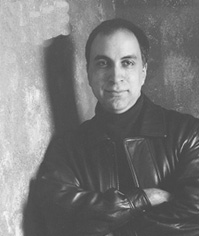
Composer Anthony Cornicello (born in Brooklyn, New York, 1964) writes music that blurs distinctions between performers and electronics, timbre and harmony, composition and improvisation, and explores the boundaries of what may be considered post-classical concert music. His music is vibrant and visceral, full of rhythmic energy and harmonic sophistication, and his forays into live electronics have led to exciting combinations of instruments and processed sound. Cornicello’s background as a jazz pianist is evident not only in the rhythmic activity of his music, but also in his constant investigation of the rich sonorities available from a variety of instruments.
He has been commissioned to write music for the Scorchio Electric String Quartet, ModernWorks! (funding from Meet the Composer/ Commissioning Music USA), the Auros Group for New Music, the Prism Saxophone Quartet, the New York New Music Ensemble, David Holzman, the Group for Contemporary Music, and the InterEnsemble of Padova, Italy. His work has also been featured on the Guggenheim Museum’s “Works and Process” series. Cornicello’s works have also been performed by the Chicago Civic Symphony, Parnassus, ALEA III, Composers Concordance, Madeleine Shapiro, Robert Black, among many other outstanding groups and solo performers. His music has been presented as part of the Darmstadt International Festival of New Music as well as the June in Buffalo Festival.
Cornicello’s Second String Quartet has been recorded by the Atlantic String Quartet; the Second Sonata for Piano by David Holzman (Centaur). More recently, his Post-Modern Waltz was recorded by Eric Moe for Albany Records. A portrait CD of Cornicello’s works is scheduled for 2006 release on Albany Records.
As a performer, he has conducted or played piano in his own works on numerous occasions. While a graduate student at Rutgers, he formed and directed the Janus Ensemble, a group dedicated to contemporary music. More recently, Cornicello has begun performing on the laptop, using a variety of interfaces and the Max/MSP program. Those performances, mostly with EEE!, have had a notable impact on his music, as EEE!’s music ranges from hip-hop to experimental noise. EEE! is based at Eastern Connecticut State University, where Cornicello is an Associate Professor and Director of the Electronic Music Lab.
Cornicello received the Ph.D. from Brandeis University, where he studied with David Rakowski, Eric Chasalow, and Martin Boykan. His teachers also include Charles Wuorinen, Gérard Grisey, and Richard Beirach.
His current fields of interest include developing unusual interfaces for live computer music performances, as well as continuing to investigate resonance and spatialization. His recent and current projects (mostly for string instruments and electronics) have been exploring the latter two, and the series of experimental works ReZenant Garden, performed by EEE! have operated on all three areas of interest. Future projects will include works for instrumental groups or soloists and electronics, as well as turntablists.
Cornicello's works are published by C.F. Peters Corporation and APNM, and he is a member of BMI.
|
|
|
|
|
|

Friday, July 08, 2005
So Here I Am
I guess I should introduce myself. I'm a "post-acoustic" composer. Most of my music makes strong use of electronics (mainly Max/MSP), although I sometimes write pieces for only non-electric instruments. I've been working with electronics since the early 80s (hey - a Minimoog in a fusion band counts!), and by now the medium has had a profound effect on how I compose.
So the term post-acoustic really is derived from Kyle Gann's idea of "post-classical." I have to agree with him, that the notion of traditional classical music (i.e., old white guys in tuxes playing the music long dead composers, and arguing over minute details like pedal markings) is dead, if not moribund. Unlike the Cassandras of the classical music world, I don't see this as a horrible thing - it's about time! I think we've all been to too many piano recitals where the literature was written between 1820 and 1840. Enough!
What will survive is the desire to create music that is based on artistic impulses, and not necessarily on financial rewards. That might link me to some classical composers, but it also links me to people like Thelonious Monk and Alvin Lucier.
I'm hoping that the term post-classical (or maybe post-acoustic) will catch on. It bugs the crap out of me when I get lumped in the 'classical' section of a record store (or on Amazon). I have little to do with Schubert (unlike Thomas Ades, but that's another blog); it would be as if the same store were to classify everything else under the popular music category. That's right, Run DMC, J-Lo, Radiohead, the Monkees, and Buddy Holly, all together. Does anyone else see the absurdity?
posted by Anthony Cornicello
|
| |



